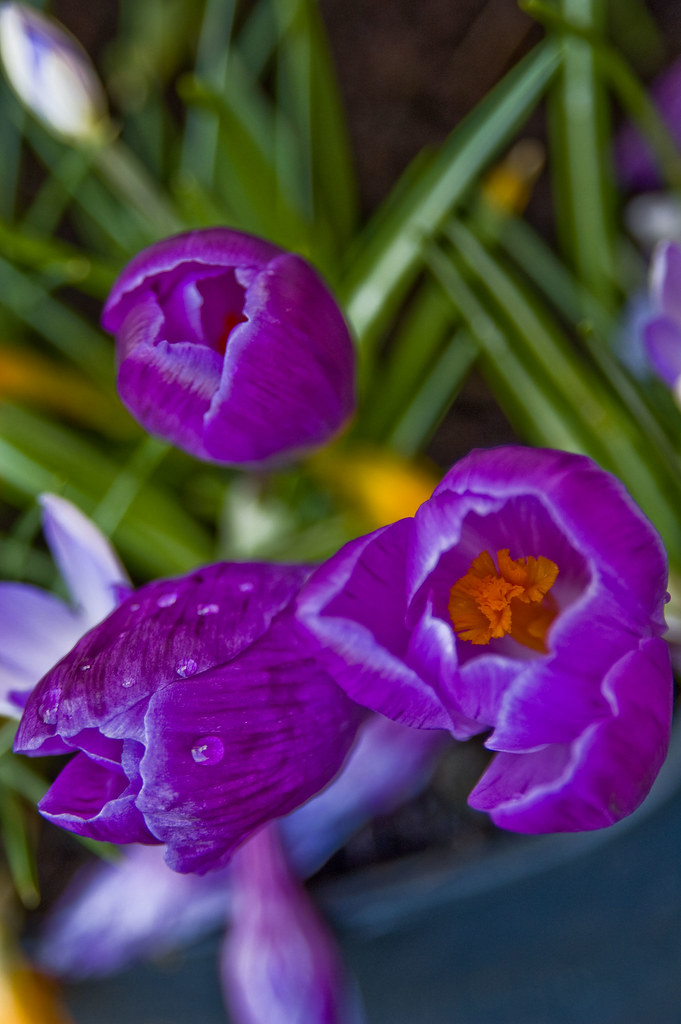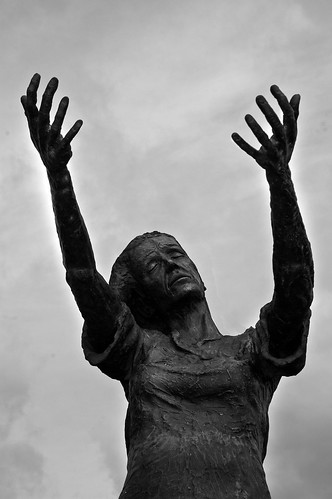Note: I don't have any pictures of Spikenard, so this Lavender photo that I took at the Eden Project a few years ago (that I have Ortonized in Photoshop Elements) will have to do ;~)
Today's Sermon: John 12:1-8
What is the most precious object that you own? How special is it to you? Would you be prepared to give it away in order to say 'thank you' to Jesus? That's a tough one isn't it! Not long after we were married, my wife and I were given a car by some friends of ours - it was a fairly old car though it was in good condition. It was an amazing act of undeserved favour - our friends had very little money and they wanted to give something that not only would be of great help to us but would be a way of saying 'thank you' to God for the many ways in which he had blessed them. To this day, that couple and their children are amongst the happiest people we know. It's a principle that I see time and time again, that the happiest people are also the most generous people and of course the reverse is true also, the more we try and hold on to things for ourselves the less happy we will be.
In today's reading from John's Gospel, the Lord Jesus is welcomed as Guest of honour at the home of Lazarus, Mary and Martha. We know Mary and Martha from the time when Jesus went to their house before and Martha was rushing around preparing food and tidying whilst Mary sat at Jesus' feet and listened to what he had to say. Of course we remember too the story of Lazarus, where Jesus raised him from the dead after he had been in the tomb for four days.
So they have this special dinner for Jesus and there are a number of other guests there also. True to form, it is the busy Martha that serves them and John tells us casually that Lazarus was one of those sat around the table with Jesus. It's funny how relaxed it all is, here is a man who was dead and in his tomb and yet now he is alive again. He is not a ghost or some kind of apparition, he is able to sit down and walk around and breathe and talk and eat! Lazarus is a walking talking miracle!
Mary, Martha and Lazarus love Jesus. People express their love for Jesus in different ways. The way that Mary expresses her love is very special and beautiful. She expresses her love and gratitude to Jesus using a pound (that is nearly half a kilogram) of perfume made of pure nard. Now Nard (or Spikenard as it is sometimes called) is no ordinary perfume. It is a flowering plant of the Valerian family that grows in the Himalayas of China, India and Nepal. The plant grows to about 1 metre in height and has pink, bell-shaped flowers. It has rhizomes (underground stems), which can be crushed and distilled into an intensely aromatic amber-colored essential oil, which is very thick in consistency (from Wikipedia). So imagine in those days getting a perfume from the Himalayas overland on camel-back thorough countless mountain passes some 3,500 miles to Israel! No wonder it was a very expensive and very precious perfume.
In those days the men would have eaten separately from the women and they would have been inclined on couches around a low table. Mary is probably standing as an attendant, she comes from behind Jesus and breaking open an alabaster jar pours this very precious oil over him and especially on his feet. She then unties her hair and wipes Jesus’ feet. There is such an abundance of oil that it has to be dried up!
This is a truly wonderful act of worship. Mary doesn’t care about what the other guests might think as she pours out her heart and her soul and her most expensive possession as an act of worship. It is wonderful when we can do that too, when we can worship Jesus with every ounce of our being and not let any inhibitions get in the way.
The moment of transcendence is broken by the voice of Judas who says:
“Why was the perfume not sold for three hundred denarii and the money given to the poor?” (v.5)
A legitimate question perhaps. This was after all very expensive perfume. I did a bit of maths. A Denarius was the amount a laborer was given for a days work. So the minimum wage today is €8.65 an hour so say at 37 hours a week and with six weeks unpaid holiday a year that is roughly €14,000 in today’s money. That was one very expensive jar of perfume and one very extravagant act of worship! To Judas this looks like unjustifiable extravagance. He gives the impression that he cares for the poor but John sadly tells us that he was, in fact a thief.
So Mary is now surrounded by disapproval, Mark tells us in his account that others joined in Judas’ indignance. Yet amid all those stern faces and mocking tones there is One face and One voice which approves of what Mary has done - and it is the only voice which matters, that of the Lord Himself. Jesus knows why Mary did this incredible thing, he says:
“Leave her alone. She bought it so that she might keep it for the day of my burial. You always have the poor with you, but you do not always have me.” (v.8)
Mary knew what she was doing. She knew that there were many who wanted to kill Jesus, many who were jealous of Him. She knew that it was only a matter of time before He was killed by His enemies – had He not said so Himself numerous times? She had bought this jar to anoint Jesus’ body for burial. This might be her last chance to do so, her last opportunity; she might not be able to get this close to him again. Mary knows that she owes so much to Jesus; she owes him her salvation and the recovery of her brother Lazarus from the dead. Her whole life has been utterly transformed by Jesus, the pouring out of fragrant perfume was both a natural and from the heart act of devotion and worship. Having freely received, she freely gave.
Jesus makes it clear that His time is coming to an end. The poor will always be with them, He would not. Just now, at this moment, anointing Him for burial was the more important thing to do. The responsibility and privilege of caring for the poor would be for the church through the ages. Matthew and Mark in their accounts of this story add Jesus’ beautiful promise:
“I tell you the truth, wherever this gospel is preached throughout the world, what she has done will also be told, in memory of her.” (Matthew 26:13)
There is an unfortunate contrast between Judas and Mary. It is natural for the reader or listener of the story to ask themselves the question as to which character most represents them. Unless we can appreciate what Christ has done for us we can have no sense of the level of debt that we owe Him. Even if we were the able to give the whole world and all its riches it would not be sufficient to pay the debt we owe. When the penny drops, when we finally realize, then we will hold back nothing from the One who gave His everything, even His life for us upon the cross.
So as we consider our possessions and the most precious things that we own, suddenly they don’t seem so valuable any more. How can we not love Jesus? How can we not feel as Mary did when we know that our sins are forgiven, when we know that we have peace with God when we know that we shall be with Him in heaven for eternity?!
Let us pray that our faith will not be like that of Judas, a mere temporary impression, like the morning cloud and early dew which lasts only for a season. Let us pray that our faith will be like that of Mary: real, true, genuine and sincere, a faith free to express itself, not caring what others will say or think, a faith that is the result of accepting God’s love, God’s grace, and a faith that is the result of a living relationship with our Lord, Saviour, Master and Friend, Jesus Christ, Amen.
--------------------------------
See also:
J.C. Ryle, “Expository Thoughts on the Gospels”, John Volume II, James Clarke & Co. 1969.
William Hendriksen, New Testament Commentary, John, Banner of Truth Press, 1998










